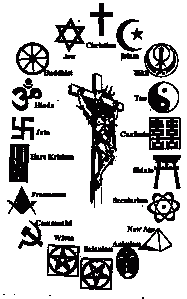So often today we hear the comment that all religions are ultimately the same. This is an expression of pluralism. Just the other day a coworker mentioned to me that they’ve been looking into religion and asked for a book recommendation. A conversation had begun and it wasn’t long until she did it too, “Well, I look at religions as paths up the mountain of truth. They all lead to God, just in different ways.” I put my pen down, quickly prayed in my mind and prepared for a deeper discussion.
“Penelope, what do you mean by saying all religions lead to God, just in different ways?” She answered with an example. She said that it’s like climbing a mountain. There are going to be many trails up and in the end they all lead to the top. She went on to describe a “Buddhist/Hindu” trail, a “Jewish” trail, an “Islamic” trail, and of course a “Christian” trail. They all start on what the hiker think is the correct path; some of the paths even intersect at times she said. But in the end each one ends at the very same overlook site at the top of the peak.
I responded this time not with a question but with a pointed answer. I first agreed that sometimes the world religions seem to have some similarities and “cross paths,” but what about the differences? Examining the world’s major religions, we see they all differ drastically when it comes to the nature of God, sin, heaven, hell, the nature of man, and salvation. So to put it simply, all religions are dissimilar in a great many more ways than they are similar.
 For example let’s compare the religions mentioned. Islam, Christianity and Judaism believe that there is a singular, personal God who is holy, omnipotent, just, omniscient, and who is creator of all. These three all believe that we are sinful human beings in need of salvation by way of God’s forgiveness. They each believe in an eternal afterlife in a heaven or a hell. Buddhists deny each and every one of these things. They believe “god” as not really a god at all but an ultimate reality. This ultimate reality is impersonal and that everything is uncreated. They deny the self, meaning there is really no sin and as such no need for salvation. Buddhists also believe that life’s goal is annihilation not an eternal life in heaven. And Hindus believe in millions of Gods. You see not all these paths lead to even remotely the same place.
For example let’s compare the religions mentioned. Islam, Christianity and Judaism believe that there is a singular, personal God who is holy, omnipotent, just, omniscient, and who is creator of all. These three all believe that we are sinful human beings in need of salvation by way of God’s forgiveness. They each believe in an eternal afterlife in a heaven or a hell. Buddhists deny each and every one of these things. They believe “god” as not really a god at all but an ultimate reality. This ultimate reality is impersonal and that everything is uncreated. They deny the self, meaning there is really no sin and as such no need for salvation. Buddhists also believe that life’s goal is annihilation not an eternal life in heaven. And Hindus believe in millions of Gods. You see not all these paths lead to even remotely the same place.
I went on to explain that sometimes we do see similarities between these world religions, especially between the main three, Islam, Judaism and Christianity as we saw above. One reason for this is that they all stem from the same religious root. But even these religions differ greatly and in ways that are irreconcilable. The most drastic and important difference is in the person and work of Jesus Christ. In order to understand this we need to look to the claims of the New Testament (NT) about who Jesus is. Jesus first and foremost claimed to be God, and the NT authors claim that Jesus was crucified, died and rose again. In fact it’s on this claim alone that the Christian faith stands or falls. Saint Paul writes, “if Christ has not been raised, our faith is in vain” and that Christians are to be “pitied above all man.” Judaism and Islam both deny Jesus is God or even claimed divinity and that he died and was raised. In denying the main beliefs of Christianity, making them all irreconcilable and clearly on paths that lead to a different places.
I finished my response by telling Penelope that Jesus said, “I am the way, the truth, and the life. No one comes to the Father but by me.” And in doing so he made invalid the claim that all religions lead to the same place. The pluralist position fails due to the law of non-contradiction. Jesus cannot be God and not God. He couldn’t have been raised and not raised. So since all religions teach different, contradictory things they cannot all be true. They can all be wrong, but they most certainly cannot all be true.
And in doing so he made invalid the claim that all religions lead to the same place. The pluralist position fails due to the law of non-contradiction. Jesus cannot be God and not God. He couldn’t have been raised and not raised. So since all religions teach different, contradictory things they cannot all be true. They can all be wrong, but they most certainly cannot all be true.

